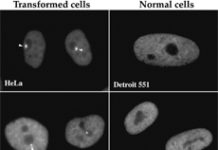Thandi Montgomery is a speaker, writer, mentor, and consultant advocating for self-discovery; health and wellness; personal branding; diversity, equity, and inclusion; and leadership among women and girls. After overcoming stage 1B breast cancer, she found purpose and aims to empower women to embrace their true selves. She is the founder of Thandi Monee’ LLC and Radiant Mom Inc. With over 12 years in advertising experience, she developed high-level marketing strategies for renowned brands, and as a keynote speaker and corporate trainer, she has inspired audiences globally. You can follow Thandi on Instagram and YouTube.
In life, I believe we all encounter crucible moments that transform us into our true selves. Such a defining moment occurred in my life in 2021, when I was 38 years old. At the peak of my physical fitness, having just earned a well-deserved promotion, and celebrating 14 years of marriage with my husband, life was seemingly going as planned. Our 2 children, ages 5 and 8, were thriving in school. Little did I know that a daunting and terrifying battle awaited me.
During a routine self-examination in August 2021, I discovered a small lump. Although I didn’t have any symptoms, I trusted my instincts and promptly scheduled an appointment with my doctor.
In September, I found myself undergoing a series of tests, including a mammogram, ultrasound, and biopsy. As the days turned into weeks, I anxiously awaited the results.
Finally, at 4 p.m. on November 1, 2021, the wait was over. I was filled with optimism when I logged on to my virtual appointment with my doctor. However, my doctor’s words shattered my hopes and brought my world to a standstill: “You have invasive ductal carcinoma.”
A rush of thoughts flooded my mind. What stage is it? My family still needs me. I can’t die now; there’s still purpose left in me. I felt betrayed by my own body because I thought I had done everything I could to stay cancer-free. Yet, in that moment, I became one of the 1 in 8 women in the United States who would be diagnosed with breast cancer in their lifetime.
Coping with cancer through therapy
Being told “You have cancer” changed my life forever. I believe life is a tapestry woven with controllable and uncontrollable events. After receiving my diagnosis, I made the decision to undergo a double mastectomy. I was hoping for a quick recovery, reconstructive surgery, and a return to normalcy. But life had a different plan. The cancer had spread to my lymph nodes, extending my anticipated 2-month journey to a grueling 12 months. Sixteen rounds of chemotherapy, 30 radiation therapy treatments, and 4 surgeries awaited me. Upon receiving the news, I was devastated, spending 21 hours in bed devoid of hope.
Eventually, I summoned the strength to rise, compelled by a small voice that whispered, “You will fight and win.” For me, facing cancer was not just a physical battle; it was a mental one as well. Recognizing that I couldn’t face this challenge alone, I sought various coping mechanisms. I meditated, journaled, incorporated more exercise into my day, and adopted a healthier diet. Exploring integrative medicine methods, I turned to acupuncture, massage therapy, and psychotherapy. Over the course of those 12 months of treatment, I attended 10 free sessions with a therapist who helped me reframe my mindset, navigate the mental aspects of my journey, and embrace the rollercoaster of emotions.
Acknowledging that some people may harbor skepticism about therapy, I, too, had reservations. Yet, I understood that I couldn’t traverse this path of coping with cancer without help. Just as I relied on my oncologist and breast surgeon for guidance regarding my physical health, I recognized the necessity of a professional therapist to fortify my mental well-being. My experience with my therapist was nothing short of remarkable, contributing significantly to my ability to thrive amidst my journey alongside my faith, family, and friends.
Throughout this challenging experience, I granted myself permission to be human and allowed for moments of vulnerability. I understood that bad moments were inevitable, but I resolved not to let them consume entire days.

“Evidence-based psychosocial and integrative therapies are beneficial resources for individuals at every stage of the cancer journey. Psychological support holds the potential to not only help you to learn effective strategies to navigate emotional challenges, but also to derive strength and meaning from the cancer experience, resulting in personal growth.” – Fay J. Hlubocky, PhD, MA, FASCO, a licensed clinical health psychologist and a health care ethicist at the University of Chicago Medicine in the Department of Medicine, Section of Hematology/Oncology, the Supportive Oncology Program, and the Maclean Center for Clinical Medical Ethics and the 2023 Cancer.Net Associate Editor for Psychosocial Oncology
Finding purpose after my cancer diagnosis
There is a popular saying: “The 2 most important days in your life are the day you are born and the day you find out why.” Though I may have temporarily lost my hair, some of my physical attributes, and, at times, my hope during cancer, I gained a profound sense of purpose and clarity about my true essence. There were moments when it was just me and my thoughts, and during those times, I delved deep into introspection, discovering my core identity. This journey facilitated an awakening, propelling me from mere existence to truly living. I emerged stronger and more resilient.
As hard as this journey with cancer was and continues to be, I firmly believe that every drop of chemotherapy not only killed the cancer cells, but also destroyed the imposter syndrome that held me back. I believe that every round of radiation therapy burned off the pressure of perfectionism. I also believe that my struggle with anxiety was removed with every surgical excision. I am a better person today because of my cancer experience.
For those who are just embarking on this path with cancer, I encourage you to take one day at a time and find something or someone worth fighting for. Make time to celebrate milestones along the way. Grant yourself permission to be human and experience the full range of emotions. Seek out support groups and consider the invaluable assistance of a therapist to accompany you on your journey. Finally, I challenge you to advocate for yourself, conduct research, and allow this experience to awaken the indomitable warrior within you.
The author has no relevant relationships to disclose.







